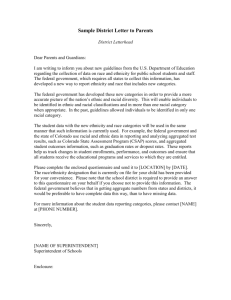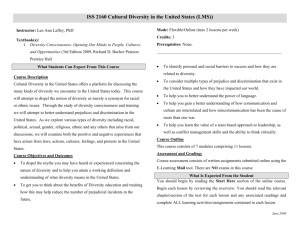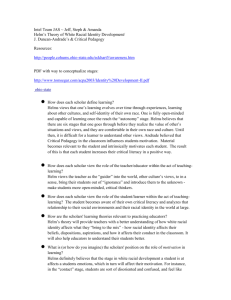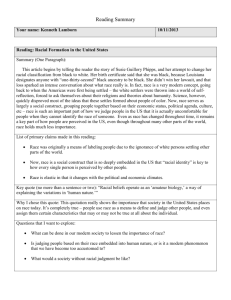Things to know about ISPRC
advertisement
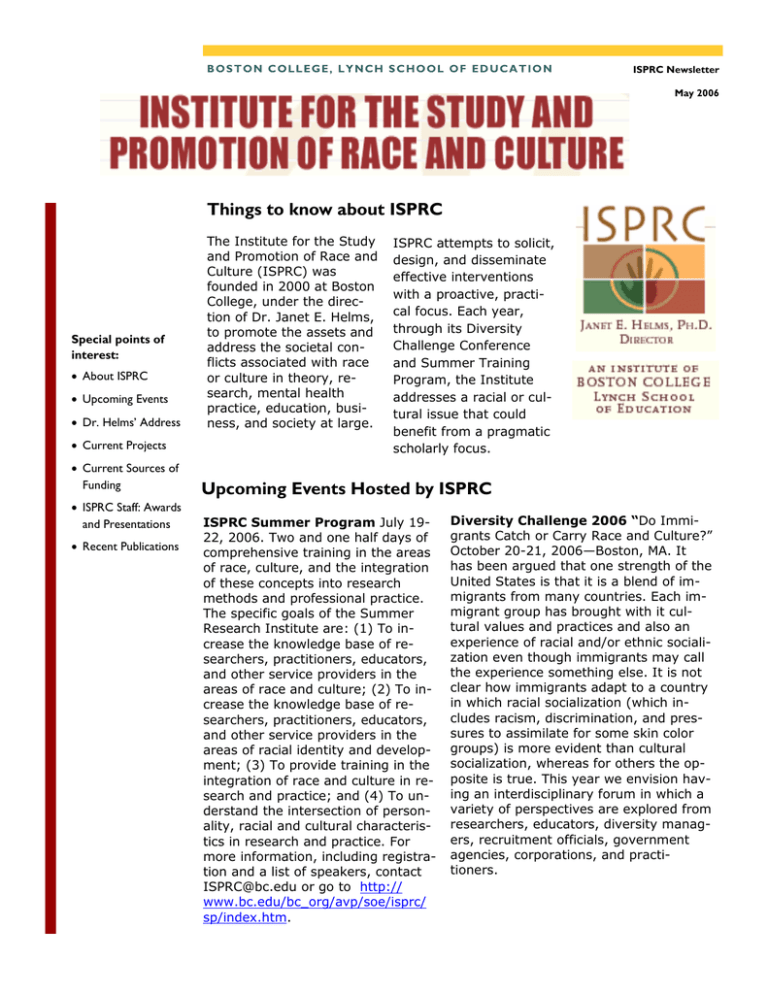
B O S T ON C O L L E G E , L Y N CH S C H OO L O F E D U C A T I O N ISPRC Newsletter May 2006 Things to know about ISPRC Special points of interest: • About ISPRC • Upcoming Events • Dr. Helms’ Address • Current Projects • Current Sources of Funding • ISPRC Staff: Awards and Presentations • Recent Publications The Institute for the Study and Promotion of Race and Culture (ISPRC) was founded in 2000 at Boston College, under the direction of Dr. Janet E. Helms, to promote the assets and address the societal conflicts associated with race or culture in theory, research, mental health practice, education, business, and society at large. ISPRC attempts to solicit, design, and disseminate effective interventions with a proactive, practical focus. Each year, through its Diversity Challenge Conference and Summer Training Program, the Institute addresses a racial or cultural issue that could benefit from a pragmatic scholarly focus. Upcoming Events Hosted by ISPRC ISPRC Summer Program July 1922, 2006. Two and one half days of comprehensive training in the areas of race, culture, and the integration of these concepts into research methods and professional practice. The specific goals of the Summer Research Institute are: (1) To increase the knowledge base of researchers, practitioners, educators, and other service providers in the areas of race and culture; (2) To increase the knowledge base of researchers, practitioners, educators, and other service providers in the areas of racial identity and development; (3) To provide training in the integration of race and culture in research and practice; and (4) To understand the intersection of personality, racial and cultural characteristics in research and practice. For more information, including registration and a list of speakers, contact ISPRC@bc.edu or go to http:// www.bc.edu/bc_org/avp/soe/isprc/ sp/index.htm. Diversity Challenge 2006 “Do Immigrants Catch or Carry Race and Culture?” October 20-21, 2006—Boston, MA. It has been argued that one strength of the United States is that it is a blend of immigrants from many countries. Each immigrant group has brought with it cultural values and practices and also an experience of racial and/or ethnic socialization even though immigrants may call the experience something else. It is not clear how immigrants adapt to a country in which racial socialization (which includes racism, discrimination, and pressures to assimilate for some skin color groups) is more evident than cultural socialization, whereas for others the opposite is true. This year we envision having an interdisciplinary forum in which a variety of perspectives are explored from researchers, educators, diversity managers, recruitment officials, government agencies, corporations, and practitioners. Page 2 Institute for the Study & Promotion of Race & Culture Welcome to the Inaugural Issue of the ISPRC Newsletter!!! “Promoting social justice at home and around the world in teaching, research, and practice.” Many people are familiar with ISPRC because of its role as host of “Diversity Challenge” over the last five years. Diversity Challenge, which aims to use an understanding of culture and race to improve the life conditions of all individuals, is an interactive conference that draws national and international experts in racial and cultural dynamics to present in their areas of expertise and specialized interests. As a result, ISPRC now has a database of over 1500 researchers and service providers with specializations in racial and cultural issues who form a core constituency for the conferences. The successive themes for the next three annual Diversity Challenges are: (a) addressing the intersections between race and culture in scientific research and service delivery for immigrants; (b) addressing the effects of racial and cultural dynamic on the lives of children, adolescents, and families; and (c) examining the intersection of culture, race, and trauma across the life span. If you have an idea of something that you think needs saying about any of these issues, we welcome your proposals! As you will see in the remainder of the newsletter, in addition to hosting conferences, ISPRC also seeks to collaborate with community organizations, schools and higher education institutions. Current Projects: Research Initiatives ISPRC & Center for Work and Family Collaborative Project Developing a briefing on the topic of race and culture in the workplace. The briefing is aligned with the mission of CWF: to act as a bridge between academic researchers and "work/life practitioners" in the business world (i.e. executives, HR departments, etc). The Executive Briefing Series is written for business executives and aims to highlight research findings and best practices in order to foster important dialogue and action plans in organizations. In this issue on race and culture in the workplace, CWF and ISPRC hope to provide the business world with research findings, raise questions, and stimulate important conversations regarding actions that are needed to create equitable work practices. Native American Images Study The use of Native American (or American Indian) images and symbols in American culture is often blatantly racist and offensive. One example of this is the use of Native American imagery by professional sports teams. A qualitative pilot study will be designed to investigate individual and group reactions to a selected variety of images. Information from the qualitative study will be used to inform future collaborative research on this topic. Addressing Academic Achievement of Students of Color in England The goal of this project is to develop a measure to assess the emotional intelligence of teachers in England in order to address the academic achievement gap between “Black” and “White” British. Continued page 3. Page 3 ISPRC Newsletter Current Projects: Research Initiatives Addressing Academic Achievement of Students in Color of England (continued from page 2) The TELS measures different types of skills that teachers use to form relationships with students in their classrooms. The term “emotional literacy” is used to refer to the different types of attitudes and skills that teachers use in their schools and classrooms. The TELS has nine scales that measure emotional literacy as described by Dr. Richard Majors. To develop the TELS, teachers and support staff from Wolverhampton College and BSixth Form College answered questions about their teaching relationships and beliefs, as well as how they behaved and preferred students to behave in their classrooms. ISPRC and Predominantly People of Color Colleges/Universities: Individual-Difference Factors that Mediate the Effects of Racial Identity on Cognitive Ability Test Scores This study is designed to examine the influence of racial and cultural individual-difference attributes on the scores on standardized tests of cognitive abilities, skills, or knowledge (CAKS) of a sample of students of color and non-dominant cultures (age 18 to 21 years) attending historically Black or predominantly minority institutions of higher education. It is hypothesized that: 1. Higher levels of Person of Color racial identity attitudes, associated with idealized identification with People of Color or idealized identification with White people, will be associated with lower CAKS test scores. 2. Universal personality characteristics, which theorists have presumed are related to test performance (e.g., test wiseness, academic self-efficacy), will not mediate the relationships between racial identity and CAKS scores. 3. Culture-specific personality characteristics (e.g., stereotype threat, acculturation) will mediate relationships between racial identity and CAKS test scores. 4. Socioeconomic variables will not mediate the relationships between racial identity and CAKS test scores. ISPRC Sponsors CEMRRAT Symposium As part of the current grant “Working within Systems: Mentoring the Next Generation of Ethnic Minority Academics,” ISPRC is sponsoring a symposium for ethnic minority doctoral students to present the research they have conducted which was funded by the CEMRRAT grant. This symposium will help to advance the career of minority students as well as educate other students on the importance of culture in psychological practice and research. Grant Activities: Current Grant Working Within Systems: Mentoring the Next Generation of Ethnic Minority Academics. Guerda Nicolas, PhD, Janet Helms, PhD, & David Blustein, PhD American Psychological Association American Psychological Association's grants implementation of its Plan for Ethnic Minority Recruitment, Retention and Training in Psychology (CEMRRAT) Project Overview The goals of this project are: (a) to increase the number of Black, Asian, Indigenous, and Latino/Latina graduate students in doctoral programs in counseling psychology, (b) to increase the number of Black, Asian, Indigenous, and Latino/Latino professional students in the academy, (c) to increase the number of Black, Asian, Indigenous, and Latino/Latina professors at the associate level, and (d) to provide a learning environment in which students can retain and share their culture, and faculty can infuse their curricula, methodologies, theories, and so forth with content specific to the concerns of U.S. racial/ethnic groups of color. Page 4 Institute for the Study & Promotion of Race & Culture Grant Activities: Grants Submitted Addressing Cultural Factors and Mental Health Disparities in Research and Practice Janet E. Helms, PhD & Guerda Nicolas, PhD Submitted to NIMH The primary goals and objectives of these conferences are: (1) to enhance the cultural knowledge base of mental health researchers; (2) to enhance the cultural knowledge base of mental health providers; (3) to provide the skills necessary to effectively integrate cultural factors into mental health research and practice; and (4) to develop strategies by which researchers and practitioners can collaborate with each other to effectively incorporate culture in their research and practice. Speakers for the conference will be nationally and internationally acknowledged researchers and clinicians presenting in their areas of expertise via interactive formats. The thematic 2-day conferences will take place at the Diversity Challenge conference at Boston College in October of 2006, 2007 and 2008. Each thematic conference will consist of a varied format including plenary sessions, concurrent in-depth workshops, and an information poster and exhibit session. Proceedings from the conference such as summaries of research reviews, speakers presentations, conference agenda, and links to powerpoint presentations of current workshop speakers will be disseminated through published monographs, and on the ISPRC web site. Addressing Racial and Cultural Factors in Research and Practice Janet E. Helms, PhD & Guerda Nicolas, PhD Submitted to the American Psychological Association There have been several conferences addressing multicultural issues and cultural competency in professional venues, especially mental health practice. However, there are no known conferences that have focused primarily on developing skills and knowledge about the integration of concepts derived from principles of racial and cultural socialization into research methodologies. This conference will provide participants with the skill sets to enable them to move beyond merely studying race and ethnicity solely as demographic variables. Instead, they will be helped to conceptualize the psychological constructs that underlie demographic variables and to integrate these racial and cultural psychological constructs into research and service delivery. At the end of the conference, participants will have had the opportunity to receive consultations from various speakers about their individual research projects. Institute for the Study & Promotion of Race & Culture Boston College Lynch School of Education Campion Hall Room 318 140 Commonwealth Avenue Chestnut Hill, MA 02467-3818 Page 5 ISPRC Newsletter Grant Activities: Grants in Preparation Mental Health AIDS Support Program for Ethnic Minorities. Janet E. Helms PhD & Guerda Nicolas PhD Submitted to National Institute of Mental Health Due to cultural beliefs about illness and customs that discourage use of Western treatment modalities, as well as educational (e.g., high rates of illiteracy) and socioeconomic (e.g., high unemployment rates) barriers, Haitians living with HIV/AIDS have been difficult to engage in traditional treatment programs. The Haitian Multi-Service Center (HMSC), has developed a culturally responsive, communitybased service-delivery model to promote good health and independent living. However, the model does not include a mental health component. Therefore, little is known about whether a mental health component will enhance service delivery. The HMSC provides services to 104 clients of African (96%), Hispanic (2%), and Caucasian (2%) descent. Most of the clients are Haitians (78%). Boston College and the HMSC will collaborate to evaluate its community-based service model in collaboration with the Haitian Health Outreach Project (HHOP), the Haitian American Public Health Initiative (HAPHI), the Center for Community Health Education & Research (CCHER), the Multi-Cultural AIDS Coalition, the Collaboration of Providers Serving Haitians, the Black HIV/AIDS Coalition, Boston Medical Center, Caritas Carney Hospital, Harvard Street Neighborhood Health Center, Mattapan Health Center, and the agencies in the Catholic Charities network. This university-community collaboration focuses on research questions of greatest relevance to the Haitian community and targets interventions identified by community members. In this project, Haitian clients will serve as the core sample in two studies aimed at evaluating HMSC’s standard practices (case management and peer services) relative to its standard practices plus a mental health intervention. Clients will be assessed at six-month intervals to determine whether type of service delivery differs in effectiveness with respect to clients’ perceptions and case manager’s perceptions of client’s psychosocial functioning (e.g., quality of life, health status, and adherence to services). The study will also explore whether there are discrepancies between clients’ self reports of their adherence to service, case managers’ reports of clients’ adherence to service, and objective reports obtained from clients’ records will also be investigated. Treatment Development and Evaluation for Ethnic Minority Adolescents Guerda Nicolas, PhD & Janet E. Helms, PhD National Institute of Mental Health This R34 application is to support a research program aimed at improving the mental health of Black adolescents in the U.S., thereby contributing to the goal of reducing mental health disparities in this country. This project will be accomplished through three main objectives: Aim 1 (pre-intervention) of the study involves cultivating a culturally sensitive understanding of the expression of depression, beliefs with respect to depression and mental health services, and an evaluation of an evidence-based group CBT intervention for Black adolescents. Aim 2 (Intervention development process) involves the incorporation of the data from Aim 1 of the study to adapt the intervention in culturally appropriate ways in preparation for the third phase of the project. Aim 3 (Feasibility study of the intervention) is a Phase 1 demonstration clinical trial project that will allow for an evaluation of the feasibility, tolerability, acceptability, and effectiveness of the modified intervention in improving depression symptoms for Black adolescents. During the intervention, the participants’ participation in the group treatment and improvements will be documented throughout the group sessions. Page 6 Institute for the Study & Promotion of Race & Culture Grant Activities: Grants in Preparation (Continued) “Initiate studies in which social policy variables pertaining to race and culture are defined at a psychological level.” The participants will be assessed using the CIDI, a structured diagnostic interview, and the CDI during the evaluation, at the end of the intervention, and at 3 and 6 month follow-ups. Collectively, this will provide us with the necessary data in order to determine whether it is worthwhile for testing in a larger sample with a clinical trial. This study is poised to contribute to the identification of “treatments that work for whom and under what circumstances” in improving mental health services and in reducing disparities, a recommendation of the recent NIMH report on Translating Behavioral Science into Action (National Advisory Mental Health Council, 2000). Parental Engagement and Activism in Children’s Education (PEACE) project Guerda Nicolas, PhD, and Janet E. Helms, PhD U.S. Department of Education Parental involvement has been shown to improve students’ morale, attitudes, and academic achievement across all subject areas (Regional Educational Library, 2001; Steinberg et al., 1996). In a three-year study of 12,000 students, Steinberg and his colleagues (1996) found that parents’ attendance at school programs, extracurricular activities, conferences, and “back to school nights” was most effective in improving students’ overall academic achievement (Steinberg et al., 1996). However, research suggests parent involvement declines drastically as students’ progress through school (Child Trends Data- bank, 2001). In 1999, 88% of elementary school students had parents who attended a meeting with their teachers, 70% of middle school students had parents who had done so, but only 51% of high school students had parents who attended a meeting with their teachers. Parents’ attendance at school events and involvement in volunteer activities and committees also declined at higher grade levels. The proposed curriculum has the potential to increase parental involvement in children’s education. Furthermore, it can potentially enhance parents’ relationships with their children as well as teachers’ relationships with parents. Ultimately, it is hoped that a two-pronged approach that engages parents and teachers in the educational process will lead to enhanced academic performance of middle and high school students. Data from the evaluation of the program will assist in further adaptation of the curriculum in order to effectively sustain the program at the various partner schools. Institute for the Study & Promotion of Race & Culture Boston College Find us on the Web at: http://www.bc.edu/bc_org/avp/ soe/isprc/default.html. Page 7 ISPRC Newsletter Meet the ISPRC Staff Dr. Janet E. Helms (Director) Theresa Sass (Research Assistant) Dr. Guerda Nicolas (Assistant Director) Sarah R. Weintraub (Research Assistant) Margaret A. McCone (Administrative Assistant) Kisha Bazelais (Research Assistant) Kathleen M. Flaherty (Administrative Assistant) Therese Mansour (Research Assistant) Konjit V. Page (Research Assistant) Angela DeSilva (Research Assistant) Maryam M. Jernigan (Research Assistant) Christopher Hamilton (Research Assistant) Kevin Henze (Research Assistant) ISPRC Staff: Awards and Presentations Dr. Janet E. Helms:The Distinguished Contributions to Education and Training in Psychology Award (2006). This award is given by the Board of Educational Affairs in recognition of the efforts of psychologists who have made distinguished contributions to education and training, who have produced imaginative innovations, or who have been involved in the developmental phases of programs in education and training in psychology. Kisha Bazelais: “Sisters in Sharing: The Experiences of Women of Color in Graduate School." Paper presented, Voices of Ethnic Minorities: Students Take Charge, Boston College, 2006. Angela DeSilva: Lynch School of Education Academic Achievement Award, 2006. “Black Immigrant Families: What Clinicians and Researchers Need to Know.” Paper to be presented at the Annual meeting of the American Psychological Association, 2006.. Maryam Jernigan: The Annual Donald J. White Teaching Excellence Award, which recognize graduate teaching fellows and teaching assistants who distinguished themselves in classroom instruction. “Sankofa: Reclaiming the Past to Promote Resistance.” Paper presented, Voices of Ethnic Minorities: Students Take Charge, Boston College, 2006. Konjit Page: Task Force Member, American Psychological Association Presidential Taskforce on Diversity Education, which provides support for instructors who address diversity issues in their classrooms. “Bringing race to the table: Discussing race-related issues in a variety of settings with Dr. Janet E. Helms, Dr. Michael Loewy and Dr. Derald Wing Sue “ Symposium Chair at Annual meeting of the American Psychological Association, 2006. “Mentoring LGB Counseling psychology students: Research, experiences and suggested guidelines.” Paper to be presented at the Annual meeting of the American Psychological Association, 2006. Theresa Sass: “Being a Parent and a Professional - Is Balancing Strategic?" Invited Panel Discussion Annual meeting of the American Psychological Association, 2006. Page 8 Institute for the Study & Promotion of Race & ISPRC Staff: Some Recent Publications Brabeck, M., Gonzalez-Eastep, D. & Page, K. (2003). Test booklet construction for the Ameri can Psychological Association Continuing Education Credits for M. Brabeck (Ed.) Prac ticing feminist ethics in psychology. Washington, DC: American Psychological Associa tion Press 2000. DeSilva, A., & Subrebost, K. (in press). Family connections among Haitians. The Clinical Psychologist. Helms, J., Jernigan, M., & Mascher, J. (2005). The meaning of race in psychology and how to change it.. American Psychologist, 60(1), 27-36. McCarroll, M.C., Page, K.V. & Tomizinis, M.L. (2006). Women mentoring women: Mentoring between APAGS and eminent psychologists. In APA Taskforce to Make Feminism Rele vant (Ed.). 2005 APAGS/ Division 35 collaboration project: Making feminism relevant. Nicolas, G., & DeSilva, A. (in press). Feminist research methodologies: A Book Review. Sex Roles. Nicolas, G., DeSilva, A., Grey, K., & Alexis, Y. (in press). Understanding Illnesses among Haitians Living in America through Multicultural Lenses. Professional Psychol ogy. Nicolas, G., DeSilva, A., & Gonzalez-Eastep, D. (2006). Spirituality among Ethnic Minorities. Encyclopedia of Multicultural Psychology, Sage Publications. Page, K. V., & Singh, A. (2006, Spring). Keeping an eye toward social justice as counseling psychology trainees. Society of Counseling Psychology Section for Gay, Lesbian, and Bisexual Awareness Newsletter, 7(1), 4. Schecter, E., Tracy, A. J., Page, K. V., & Luong, G. (2005). "Doing Marriage": Same-sex rela tionship dynamics in the post-legalization era. In Same-Sex Marriage Study Group (Eds.), What I did for love, or benefits, or...: Same -sex marriage in Massachusetts, Wellesley Centers for Women, Working Paper No.422. Wellesley, MA: Wellesley Cen ters for Women. Schecter, E., Tracy, A. J., Page, K. V., & Luong, G. (2005). Shall we marry? Legal marriage as a commitment event in same-sex relationships during the post-legalization period. Wellesley Centers for Women, Working Paper No.424. Wellesley, MA: Wellesley Cen ters for Women. Zetzer, H. & Page, K. V. (2006, Spring). Making a difference: Interviews on LGBT mentor ship. Society of Counseling Psychology Section for Gay, Lesbian, and Bisexual Aware ness Newsletter, 7(1), 7.


